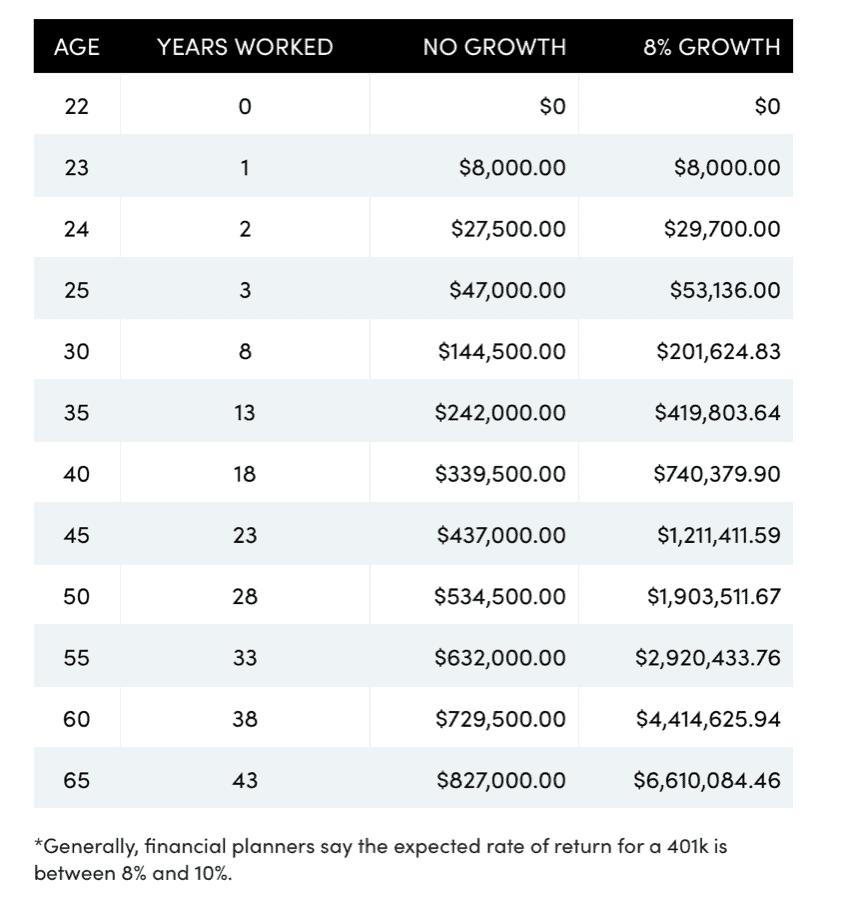Great news! You just got a new job, and your employer offers a 401(k) retirement benefit to help you start saving for retirement. The only thing is that you have no idea which one is best. Don’t worry – you are not alone! This article will dive into why having retirement savings is important and helpful hints on how to choose the right retirement plan account. Having an employer-sponsored 401(k) benefit is not something that you should skip out on.
The Retirement Crisis
Being invested in a 401(k) is vital for your future self. Only 32% of Americans are invested in a 401(k), while 59% of Americans have access to one. However, an employee is 15x more likely to save for retirement if their employer offers a 401(k) benefit. The retirement crisis in America is a real problem. A retirement crisis is a term coined by financial experts to describe the inability of working Americans to save money for retirement. Most Americans will not have enough money to retire once they reach retirement age.

Many people think retirement is an old person issue that should only be addressed once you are old enough to start thinking about retirement. But that is very wrong! A retirement account is a long-term investment vehicle that increases value over time. Once again, the earlier you start saving, the better! When you finally get to retirement age after years of hard work, you are going to thank yourself for investing in a 401(k) early on.
If you still don’t believe me, here are some numbers to prove the fact that America has a retirement crisis:
- Nearly 50% of Americans reaching age 65 have less than $25,000 saved away.
- 1 in 4 Americans doesn’t have even $1,000 in savings.
- 62% of black households do not have any retirement savings
- More than two-thirds of Latino workers do not have any type of retirement savings
- Nearly 1 in 5 people have less than $5,000 in retirement savings.
This idea of starting to invest in your retirement account early is the same idea of compound interest. Feel free to read my compound interest article if you would like to learn more about how compound interest works. By looking at the chart below, you can see how much your retirement account can grow over time if you started working a full-time job at age 22 and were offered a basic 401(k) with no employer match. Please refer to other assumptions here for an in-depth explanation.

Traditional vs. Roth accounts
You may be wondering what the difference is between a traditional 401(k) and a Roth. The main difference is how each account is taxed on the money.
Traditional 401(k)
A traditional 401(k) is just a pretax savings account. When you invest money into a regular 401(k), you do not pay any taxes on the investment (pretax) until you take out that money.
- Pay taxes later, take home more now in your paycheck
- Pay taxes on withdrawals in retirement
Roth 401(k)
A Roth 401(k) is just the opposite of a traditional account – it is simply just a post-tax savings account. When you invest money into a Roth 401(k), you pay taxes immediately and do not have to pay taxes when you take out that money.
- Pay taxes earlier, take home less now in your paycheck
- Tax-free withdrawals in retirement
Contribution Limits
You may have heard something about contribution limits in retirement accounts. Contribution limits are an integral part of retirement accounts to consider and is decided by the IRS – so don’t blame your employer for these numbers!
- For employees (under age 50) who have a 401(k), the contribution limit for 2020 has increased from $19,000 to $19,500.
- For employees (50 or older) who have a 401(k), the contribution limit has increased from $25,000 to $26,000.
- For employees and employers, the total combined annual contribution limit in 2020 cannot exceed $57,000 or 100% of your compensation, whichever is less.
Overall, both retirement accounts are a great savings tool for your retirement. If you are wondering what I personally decide to invest in, it would be a Roth 401(k). Since I am 23, I decide to go with a Roth 401(k) rather than a Traditional 401(k) for a few reasons why:
- I am at a lower tax bracket now (early in my career) and would rather pay taxes now. There is no true way of predicting future tax brackets in the future, but my tax bracket will hopefully increase as I get older.
- I want to take the full amount out when I retire and claim a larger amount. I prefer to pay taxes now for that reason!
Conclusion
Overall, retirement accounts are a great tool to help you have a fluffy egg nest when you are older. Don’t you want to be able to do some cool things in your 60s and 70s? I do!
I hope that this article has encouraged you to start taking advantage of your employer’s retirement benefit offer. Although retirement may seem very far away, I promise that it will not hurt to start investing in your retirement account today!

Ashley is a finance graduate from the University of San Francisco and currently works at a financial technology startup in San Francisco that is focused on providing affordable and accessible 401(k) retirement plans to other startups and small businesses. Prior to working at a startup, she was an associate at a large private wealth management firm working with high-net-worth clients. She is born and raised in Orange County, CA, and loves spending time at the beach, in a pool, reading, and with her friends.

